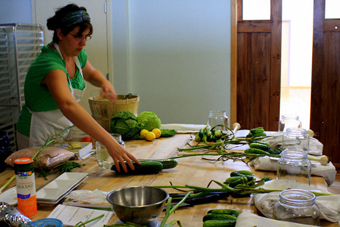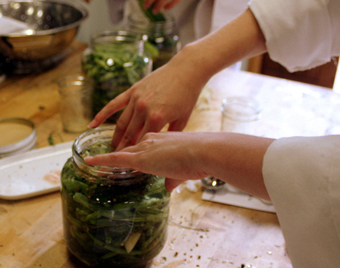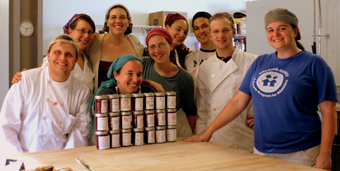Farming the urban landscape
Permanent link

Gan Project founder Jill Zenoff prepares supplies for a pickling workshop. Photo credit: Suzanne Nathan
Jill Zenoff, Suzanne Nathan and Anne LaForti have big plans for a quarter-acre patch of land in West Rogers Park. The land, on the grounds of the Bernard Horwich JCC, will bloom and produce food.
It will be an urban agricultural oasis, with people from the neighborhood working the mini-farm―dirt and all―weeding and harvesting produce. It will teach children and teens about where their food comes from. It will be a space where pre-bar and bat-mitzvah youths can perform mitzvah projects and raise funds.
This idyll is far from realization just yet. Still, as the brains and hands behind the Gan Project (gan means garden in Hebrew), the dynamic trio is undaunted by the numerous tasks to be tackled before their dream space is created.
The garden space at Horwich is just one piece of a puzzle that they hope will foster an environmentally conscious, sustainable Jewish food system and increase access to clean, safe foods.
More than that, urban gardening and food growing will create “a sense of connectedness to the land and to the community,” hopes Zenoff, who spent a summer interning at a downstate Illinois farm last year and picked up other agricultural skills through a stint with the ADAMAH Jewish farming program at the Isabella Freedman Jewish Retreat Center in Connecticut.
In addition to the JCC, the Gan Project hopes to team up with local families, community organizations and congregations to spread the message to the masses: take back control over your food—in a Jewish way.
They kicked everything off with a series of summer workshops that had participants picking strawberries and making jam; learning pickling techniques; and making Kombuch (a fermented tea often drunk for medicinal purposes). August will bring more learning opportunities, including picking blueberries and making jam; touring an existing Jewish communal garden; making healing salves from left-over summer herbs; and cooking up a batch of sauerkraut. Several of the programs are presented in partnership with Birthright Israel NEXT Chicago, which works with Birthright trip alums throughout the city and suburbs.

A pickling workshop participant finishes loading mason jars of dilly beans. Photo credit: Suzanne Nathan
“There is so much strength in developing new skills whether it’s farming or food preservation. There’s a sense of empowerment and a sense of autonomy,” said Nathan, who holds a master’s in social work from the University of Chicago.
Zenoff and LaForti have been friends since childhood and together presented the idea for the Gan Project to Nathan, also an Isabella Freedman alum, on the way to a Birthright NEXT-sponsored Eco-Shabbaton in Wisconsin in April. They are funding the project themselves and working to get grants from Birthright NEXT, Hazon and other organizations.

Eleven people made 21 jars of strawberry and raspberry jam during a recent Gan Project workshop. Photo credit: Suzanne Nathan
The Horwich JCC gave them office and planting space. Meanwhile, the three founders also are working to develop curricula for elementary, middle and high school students as well as programs for families and older adults.
The idea is to create a network of eco-conscious Jews from generation to generation. But for now, it’s baby steps.



.jpg)



